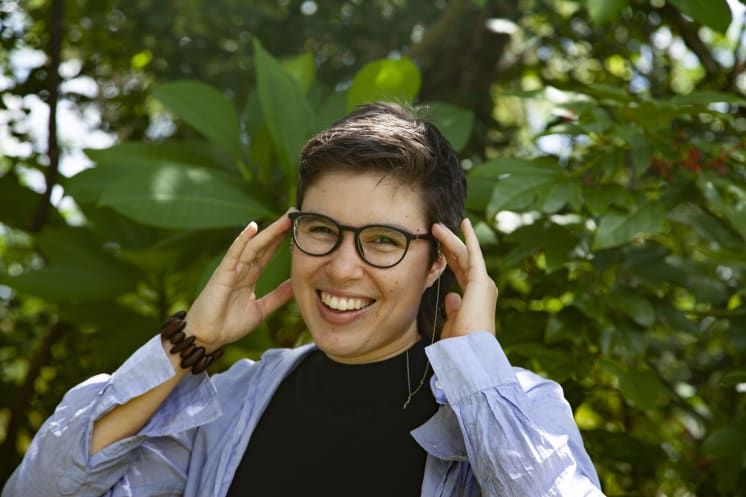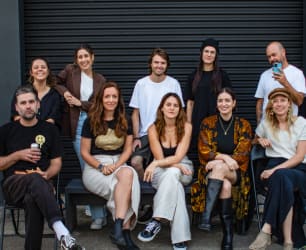Ellen van Neerven is one of this generation’s most prolific and generous First Nations writers producing thought-provoking work through their poetry collections 'Comfort Food' and 'Throat' and stand-alone novel 'Heat and Light'. And they'll be at Byron Writers Festival next week.
Working within the themes of gender, colonisation and First Nations culture, van Neerven sheds a soft but consistent light on the ever-present ways that racism, gender disparity, and colonial practices are always present in the Australian landscape.
Now, they’ve released their first work of nonfiction, which explores the complex topic of sport in Australia, and not only van Neerven's passion for sport (namely soccer) but the colonisation practices that have changed its essence over time and how strict gender conformism is a thread that runs deep into the roots of sport, excluding anyone who doesn't fit into its binary.
We caught up with the award-winning writer before they head down to Arakwal Country to discuss their newest book, 'Personal Score: Sport, culture, identity' at Byron Writers Fest.
Jumping on the phone with van Neerven the morning after the first game of the 2023 FIFA world cup series, they are understandably filled with a lot of mixed emotions.
“We went to the match last night where the Matildas lost to Nigeria. It was a bit heartbreaking because we were up 1-0, and then we ended up losing 3-2,” they admit.
“At the same time, there were a few Nigerian supporters there, and they were so happy, and I was just kind of happy for them to win. I think that's what this tournament is like. Everyone's just really respectful, and so people clap the opposition, which is not something that usually happens in sport. It can often get kind of ugly.”
In 'Personal Score', van Neerven goes into depth on the ‘ugliness’ of sport, discussing its often racist roots and unyielding rules around gender. Still, of all the reasons to write this book, van Neerven explains that the deep and unrelenting passion for soccer they’ve held since they were a small child ultimately compelled them to start.
“I probably got the idea to write the book about eight years ago. Originally, I thought it might be a novel, but I didn't really know what form it was going to take. But I knew there was something I wanted to explore within my complicated relationship with sport, and how there are so many things that are related to sport that are not really spoken about.
“Eventually, I started writing it more as a straight nonfiction book, so it didn't really have much memoir in it, and then when I was in my mid to late 20s, I was really thinking a lot about my gender identity, so then that sort of changed the course of the book again. Those memories between the ages of 11 and 20 were very, very strong, and I wanted to write them down and explore them.
A large part of those memories is van Neerven’s journey with their cultural history, and they go on to explain that they had so much to learn when they were younger about growing up in Brisbane on Yuggera and Turrbal land and also belonging to the Yugambeh people of the Gold Coast.
“Working that out when you're younger and working out where your family connections are, where your land and water connections are, and what that sort of means in terms of where you grow up and how you travel is important and complex.
“So, in my book, I explore the first travel that I did as a youngster for soccer training and playing at a representative level. I thought that was a really interesting premise to have throughout the book and to share the places I travelled to and my understanding of where I was and who I was.”
“So that's all the personal stuff, but then, of course, there's all of the bigger picture stuff that I wanted to explore in terms of queerness, women's sport, First Nations representation in sport and all the things about sport that I feel like potentially weren't spoken about enough and to approach it in a very different way, in terms of what people expect a sports book to look like.
“The last couple of years has really been about sort of bringing [the book] together and putting it into a shape that I’m happy with. I feel that the sort of shape and form, in some ways, mirrors the fluid and complicated and messy feelings that I have about sport.”
Arguably, the best parts of this book are van Neerven’s interwoven personal anecdotes, where they are almost painfully honest about their experiences growing up. It creates an unbreakable connection with the reader as they embody van Neerven’s palpable passion for soccer and feel every raw and exposed feeling when they discuss the endless bullying they’ve endured.
“I wrote the really raw parts [in the book] a few years ago, and then, when I was coming back to look at them in the editing stage, I re-read some of those parts when I was a young person and really going through a hard time with people around me - like other kids, and I started to get really emotional reading back on those - I forgot how raw it was written.”
It’s clear that there are high rewards when creating an unbreakable connection with the reader through raw and unfiltered personal stories, but van Neerven makes it clear that there will always be give and take and that writing with an unfiltered mindset sometimes comes at a cost.
‘I think every writer is different, so you're going to know the stories you feel comfortable having out there in the public. A really important thing that I've learnt is that writing belongs to me, and the book belongs to the readers.
“In some ways, there's a natural progression. You get the book ready, you go through and edit, you get it published, you get the book in your hands, and then, you sort of realise the book is no longer really close to you, it's more of an extension of you now, and other people are reading it through their eyes and through their hearts.
"They might resonate with parts you never expected, and that is just the most amazing feeling because people are sort of bringing their experiences and perspectives to the work, and it becomes much bigger and so much faster.”
When asked how they protect those tender moments in an everyday sense after the book is released, van Neerven contemplated for a moment.
“I have this really strong view that a writer should sort of look after themselves as much as possible if they want to continue writing, which most of us do,” they explain.
“It’s important that we feel safe when the book comes out, no matter the noise. And it's very noisy - there are lots of opinions, mostly good, of course, but it can be a very overwhelming time to have your book out there in the public lens.
“So it’s important that you feel connected to the craft of writing and still feel like it's sort of something that you can continue to create because the act of creating is very different to the publicity for our work, but it’s the most important aspect of being a writer, is staying connected to the craft.”
You can catch Ellen Van Neerven, along with many other talented Aussie writers, at Byron Writers Festival from August 11-13.






